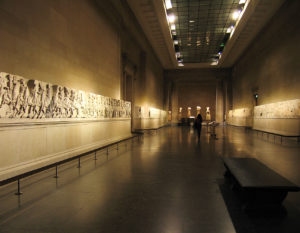It may be a bit of a stereotype that London is a gray, rainy mass straddling the Thames. However, London was hit with some particularly heavy rain in the last week of July, to the point that parts the British Museum experienced some leaking and flooding. The affected galleries mainly housed parts of the museum’s Greek and Assyrian collections; galleries which had been closed for about seven months prior to this. Subsequently, and unsurprisingly, their reopening has been delayed. While the museum failed to specify which of the galleries were affected, the Greek collection at the British Museum includes the Duveen Gallery, specially designed in 1938 to hold the controversial Elgin Marbles.
The Elgin Marbles are the collection of statues, metopes, and friezes taken from the Parthenon and brought to London in the first years of the nineteenth century by Lord Elgin, the British ambassador to the Ottoman government. Even since they arrived in London, many have called for their repatriation back to Athens, where they can be displayed at the Acropolis Museum alongside everything else recovered from the ancient site. The early nineteenth-century English travel writer Edward Daniel Clarke referred to Elgin’s theft as “a greater injury [to the Acropolis] than it had already experienced from the Venetian artillery”. He continued that the removal of the marbles “amounted to nothing less than its destruction: – take it down, and all the aim of the sculptor is instantly frustrated! Could any one believe that this was actually done? and that it was done, too, in the name of a nation vain in its distinction for the Fine Arts?” All this time, the British government has remained stubborn in their arguments that not only is their ownership of the sculptures completely legal, but that the marbles are better protected and better cared for in London than in Athens. While the British Museum has stated that the recent leakages did not result in any damage to the sculptures, the Greek Culture Minister Lina Mendoni took this as an opportunity to weigh in yet again on the persistent issue of the marbles’ repatriation: “The abandonment shown in the pictures from the British Museum reinforces Greece’s rightful demand for the sculptures’ permanent return to Athens and their reunification with the Parthenon.” While the museum did not specify the Duveen Gallery as one of the rooms affected by the rainwater leaks, journalists who were able to look past barriers into the gallery saw fans were moved in among the statues, indicating that the room was indeed experiencing humidity issues.
This is not the first time that rainwater has flowed through the Duveen Gallery since in 2018 Greek television showed footage of rain leaking into the gallery past one of the friezes. This also is not the first time that the poor conditions of some of the galleries at the British Museum have been highlighted. In January 2020, there were leaks spotted in some of the Assyrian galleries, close to the Elgin Marbles. While the museum’s director, Hartwig Fischer, has spoken of the need to renovate the buildings owned by the museum for years, he has tended to place a greater emphasis on redisplay. Specifically, Fischer has addressed the need to be less Eurocentric in what the museum chooses to show in their galleries.
The issue of art repatriation is a difficult field to navigate sometimes. The Elgin Marbles are probably the most prominent example of such difficulties. Most recently, a trove of approximately 17,000 looted artifacts was repatriated to Iraq, making it the largest collection ever returned to the country. It is speculated that most of the pieces, mainly clay tablets and seals, were looted over the past two decades, aided by the chaos of the violence and political instability initiated by the 2003 US invasion. It is only the most recent victory in the push to pressure Western art institutions to return cultural treasures to their countries of origin. Commenting on the occasion, the Iraqi Culture Minister Hassan Nadhem stated, “It restores not just the tablets, but the confidence of the Iraqi people by enhancing and supporting the Iraqi identity in these difficult times.” Most of the collection had been previously held by the controversial Museum of the Bible, operated in Washington DC by the Green family, the owners of Hobby Lobby. You may remember the Green family from a similar controversy not long ago: In 2017, the Justice Department issued a $3 million fine to the family for their failure to exercise due diligence when they bought about 5,000 pieces for their evangelical museum.
The brilliant British comedian, television presenter, public intellectual, and avowed Hellenophile Stephen Fry once proclaimed in a debate over the Elgin Marbles, “Perfidious Albion, which is the name by which Britain has been known for so long, this untrustworthy country that still has colonial ambitions, let’s not be that anymore. Let’s be a classy country.” With this recent success in Iraq, as well as headway being made in the repatriation of bronze sculptures claimed by Nigeria, support for the Elgin Marbles remaining in London is steadily growing thinner. Now with rainwater flowing between the statues, it seems that the galleries at the British Museum are not as world-class as many would make them, knocking yet another supporting buttress from under the arguments of Elgin apologists.
By: Nathan Scheer

